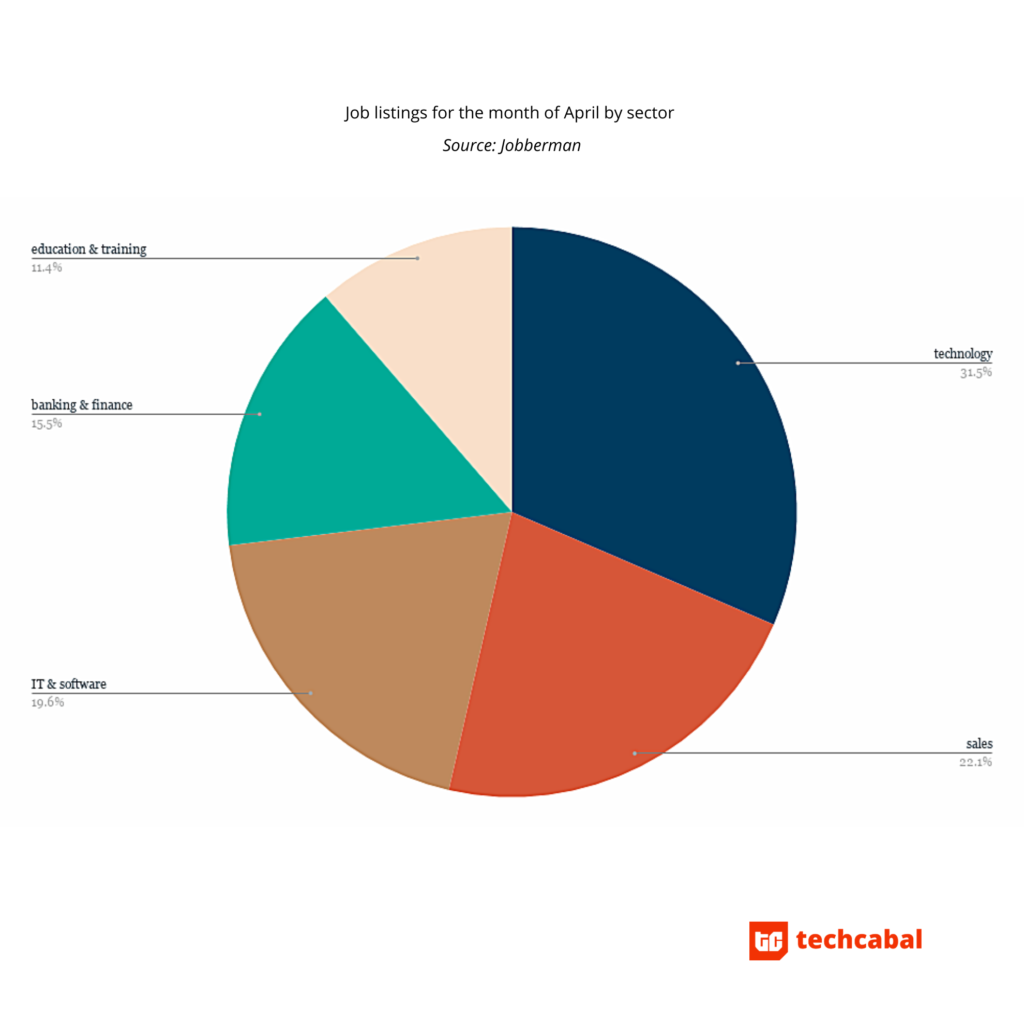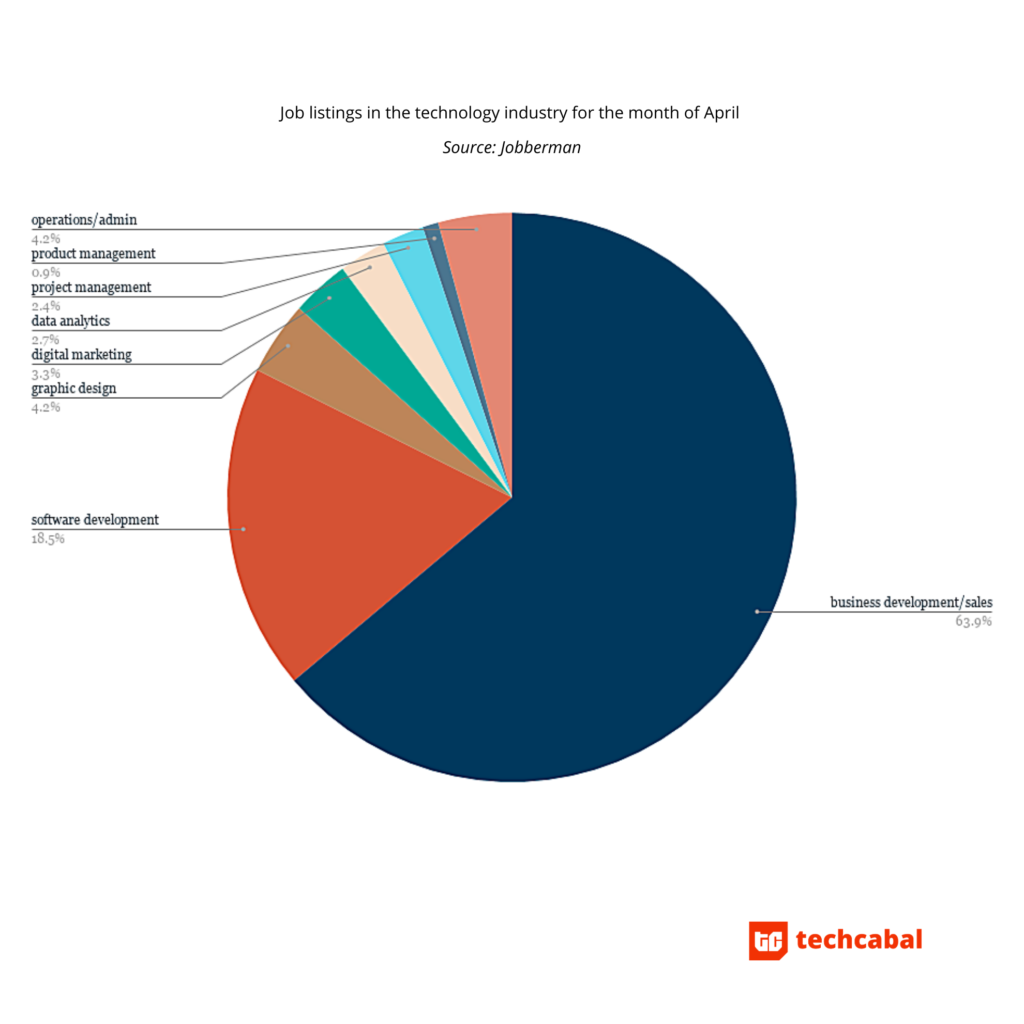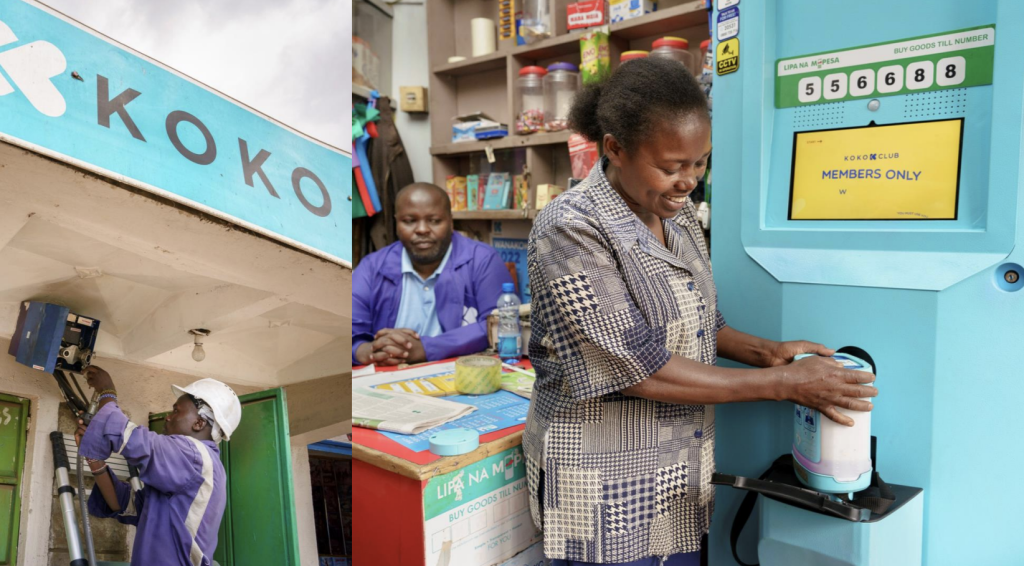Fuelled by the global health crisis that has seen businesses closed for months across the continent, job placement site Jobberman says there was a 70% decrease in job listings and 17% decrease in jobseeker sign ups in the beginning of March, just weeks short of the start of lockdowns in Nigeria and most of the continent.
However, a #UnityInAdversity campaign through which it has allowed employers post job listings for free on its platform has brought about a 183% increase in new job listings in April, more than what was obtainable in Q1 2020.
Jobberman’s data also reveals that almost a fifth of these listings are for positions in the tech sector (18.79%). Followed by sales (13.2%) are listings in the IT & software industry (11.69%). Roles in banking, finance and insurance (9.27%), education and training (6.78%) have also been prevalent.

Specific roles within the technology industry that saw an increase in demand in the month of April were: business development/sales (62.94%), software development (18.24%), graphic design (4.12%), digital marketing (3.24%), data analytics (2.65%), project management (2.35%) and product management (0.88%).

Current job losses across the globe have reached unprecedented levels since the start of the coronavirus pandemic. In the US, at 39million job losses in nine weeks, the rate of unemployment is at levels unseen since the Great Depression, a decade’s worth of employment gains wiped clean.
In the continent, GDP is expected to contract 0.8% (1.1% in the worst case scenario) this year and 20 million jobs are already at risk both in formal and informal sectors, the latter which accounts for a majority of employment in the continent.
Despite the heavy adoption of tech-enabled services and businesses at this time, the tech industry has largely not been spared the flood of job losses and salary cuts most employers are resorting to in order to stay afloat and survive a pandemic whose ripple effects might last for the unforeseeable future.
Nonetheless, the tech industry holds significant capabilities in resuscitating the labour market post-COVID as evidenced by Jobberman’s recent report, a factor the World Bank says will be critical in economic recovery for countries across the globe.
“Technology has kept many businesses going through this pandemic, especially when lockdown measures have been in place,” Hilda Kabushenga Kragha, CEO of Jobberman Nigeria tells TechCabal.
“As the labour markets settles back into the swing of its usual activities, technology has the potential to connect people and opportunities more effectively than before.”
And while there are many ways the industry presents these opportunities both for employers and employees, there are also challenges that have become critical and whose solutions determine how effective the sector is in reviving job markets in this period.
The idea of remote work isn’t new but in the last two-three months, organisations that have previously hesitated to adopt this have been forced to trial working remotely and many are seeing that it isn’t impossible.
According to Kragha, this is a good thing particularly for small businesses as operation costs can be significantly reduced without the burden of a physical space and all its attendant costs.
“Technology is the primary facilitator of remote work which will become more commonplace going forward,” Kragha says.
But this shores up more challenges, inclusivity for one, according to Amandla Ooko-Ombaka, Associate Partner at McKinsey & Company and author of the Tackling COVID-19 in Africa Report, which is of immense importance specifically to the informal sector as the biggest employer of labour on the continent.
“In as much as Silicon Savannah, all these wonderful things are happening, the number of people that have coverage but not actual access to the internet and mobile is still staggering on the continent,” Ooko-Ombaka said at the TechCabal Bullish on Africa virtual conference in May.
At 39.3% internet penetration, more than half of the continent’s population are still unable to access the internet or reap the benefits that digital tools and skills bring.
Asides inclusivity, Ooko-Ombaka says technology tools and businesses also come to play as governments seek to provide financial stimulus to small and medium scale businesses to cushion the effects of the pandemic. Data collection and aggregation tools from technology companies can prove useful in making sure these are disseminated effectively and efficiently.
Another way that the sector can help resuscitate the job markets in Africa, Ooko-Ombaka says, is in the rethinking of the jobs of the future. We have touted the ‘future of work’ so long and now, the realities of the time are rapidly speeding us into that future. With more technology adoption will come new and reimagined roles that will require new talent and skills to fill as well as present new opportunities for people to upskill to fit into new roles.
Going by Jobberman’s April statistics, roles in data science, software development, business/sales of technology products and services among others most likely will continue to see an increase in demand moving forward.
Areas like cybersecurity and data security/storage are also likely to experience an increase in demand for talent as more activities move online to maintain social distancing rules post lockdowns.
“The tech ecosystem can help us think about what the second, third of fourth iterations of these [technology-driven] changes might be,” Ooko-Ombaka says.
In addition to technical skills to meet increased demands in any of these aforementioned areas, however, the acquisition of soft skills will also become a huge determinant of employability as competition for available jobs stiffen hence the company’s free digital soft skills training programme.
“It is great to see that there are still some job opportunities despite the ongoing COVID-19 pandemic,” Kragaha says, “There will be a lot of competition for these roles, however, and only the candidates that set themselves apart will be best placed to take advantage of these opportunities.”
“We have found that soft skills such as emotional intelligence, business etiquette, time management, which are often overlooked and underestimated, can make a big difference.”
Regardless, the journey to recovery will be long and arduous, and as Ooko-Ombaka says, will require persistent conversation and working together between the government and the industry stakeholders as countries move forward to reviving their economies post-COVID.















